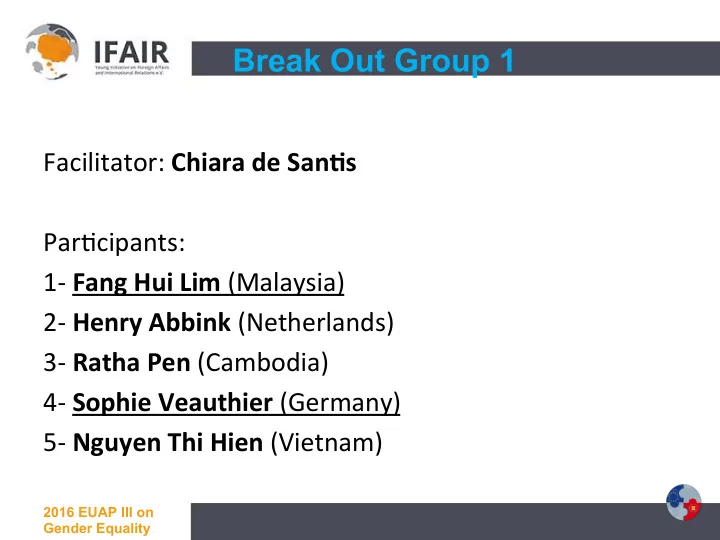

Break Out Group 1 ¡ Facilitator: ¡ Chiara ¡de ¡San+s ¡ ¡ Par,cipants: ¡ 1-‑ ¡ Fang ¡Hui ¡Lim ¡(Malaysia) ¡ 2-‑ ¡Henry ¡Abbink ¡ (Netherlands) ¡ 3-‑ ¡ Ratha ¡Pen ¡ (Cambodia) ¡ 4-‑ ¡Sophie ¡Veauthier ¡ (Germany) ¡ 5-‑ ¡Nguyen ¡Thi ¡Hien ¡ (Vietnam) ¡ 2016 EUAP III on Gender Equality
1. ¡Gender-‑sensi,ve ¡educa,on ¡ Problem ¡ • Culturally ¡embedded ¡gender ¡stereotypes ¡at ¡the ¡core ¡of ¡inequality ¡ • Cultural ¡norms ¡once ¡internalized ¡difficult ¡to ¡‘unlearn’/pierce ¡through ¡ • Care ¡giving ¡(from ¡early ¡educa,on ¡to ¡nursing ¡care) ¡is ¡s,ll ¡mostly ¡a ¡female ¡ domain. ¡ • Daughters ¡spend ¡more ¡,me ¡than ¡sons ¡caring ¡for ¡elderly ¡parents ¡ • Propor,on ¡of ¡female ¡teachers ¡in ¡primary ¡and ¡secondary ¡educa,on ¡has ¡been ¡on ¡ the ¡rise ¡since ¡1990 ¡(UNESCO ¡2012: ¡98) ¡ à posi,ve: ¡female ¡role ¡models ¡ à nega,ve: ¡males ¡underrepresented ¡esp. ¡In ¡early ¡educa,on, ¡nursing ¡care, ¡unpaid ¡ care; ¡female ¡teachers ¡underrepresented ¡in ¡higher ¡educa,on ¡
1. ¡Gender-‑sensi,ve ¡educa,on ¡ Status ¡quo/what ¡has ¡been ¡done ¡ Gender ¡mainstreaming ¡in ¡both ¡ASEAN ¡and ¡EU ¡ • Paid ¡leave ¡for ¡mothers ¡is ¡nearly ¡universal, ¡but ¡mostly ¡very ¡limited ¡in ¡,me ¡ • Paid ¡leave ¡for ¡fathers ¡remains ¡an ¡excep,on ¡ • Despite ¡progress ¡Educa,on ¡for ¡All ¡goals ¡(1990) ¡s,ll ¡need ¡to ¡be ¡met ¡ • Secondary ¡teaching ¡force ¡now ¡equally ¡divided ¡between ¡males ¡and ¡females ¡ • (UNESCO ¡2012: ¡99) ¡ à ¡less ¡progress ¡in ¡ter,ary ¡educa,on ¡ Growing ¡number ¡of ¡subject ¡specific ¡programs ¡on ¡secondary/ter,ary ¡educa,on ¡ • like ¡´MIND ¡THE ¡GAP´ ¡(EU) ¡ à ¡Some ¡progress ¡when ¡it ¡comes ¡to ¡infant ¡care, ¡less ¡progress ¡ when ¡it ¡comes ¡to ¡care ¡for ¡children ¡beyond ¡infancy ¡and ¡elderly ¡ parents ¡
1. ¡Gender-‑sensi,ve ¡educa,on ¡ Recommenda+ons ¡(focus ¡on ¡early ¡educa+on) ¡ Reframing ¡different ¡kinds ¡of ¡care ¡giving: ¡awards ¡(nomina,on ¡on ¡grassroots ¡ • level), ¡social ¡media ¡campaigning, ¡personalizing ¡the ¡profession ¡ Best ¡prac,ces ¡on ¡parental ¡leave ¡for ¡both ¡parents ¡(e.g. ¡Sweden) ¡ • Best ¡prac,ces ¡on ¡elderly ¡care ¡(Japan: ¡case ¡management) ¡ • Monitoring ¡mechanisms ¡on ¡a ¡regional ¡level ¡ • Support ¡for ¡male ¡teachers: ¡networking, ¡barbershops ¡ ¡ • Fostering ¡interregional ¡coopera,on ¡on ¡projects ¡in ¡secondary ¡and ¡ter,ary ¡ • educa,on ¡ Developing ¡(inter-‑)regional ¡campaigns ¡on ¡gender-‑sensi,ve ¡toys ¡and ¡reading ¡ • material ¡as ¡part ¡of ¡a ¡broader ¡plan ¡to ¡raise ¡awareness ¡(+use ¡of ¡social ¡media) ¡
2-‑Engage ¡male ¡in ¡gender ¡equality ¡ Problem: • Men = nearly 50% of the world population • Gender = social relations between However, at present: • Patriarchy is still prevalent & maintains men’s power • Men= gatekeepers to the positions of power • Women burdened with domestic work, child and elderly care • Most of men consider ⇒ women’s matter & work • Men are often excluded from gender discourses ⇒ = commitments + engagement + actions of
¡ 2. ¡Engaging ¡males ¡in ¡gender ¡equality ¡ ¡ Status quo/Things done: • “He for She” campaign initiated by UN Women (2014) • Egypt - Male leaders’ engagement in ending FGM • Indonesia & Pakistan - Men in support of safe motherhood • Australia - “Male Champions of Change”; • Turkey - Fatherhood Support • Sweden - Paternity leave (13 months for ) à Ongoing, need more campaigns on promoting men’s engagement in GE promotion at both regional and global level à Ongoing need for anti-discrimination laws as basis for men’s engagement in GE promotion (esp. on shared family work & care ¡
2. ¡Engaging ¡males ¡in ¡gender ¡equality ¡ Recommendations: At regional and global level: EU, UN WOMEN, ASEAN: • Regional & global campaigns ⇒ men’s engagement in GE promotion à Incentivize state parties to design & implement campaigns/projects/ programs to engage men in GE promotion à Global & regional policy dialogues on GE with engagement of male and female leaders ⇒ open fora and public commitment At local (national level): • Gender quotas for leadership posts in politics, social, economic and cultural organizations and agencies à (inter-)regional best practices • Using social media to campaign on changing gender roles • Training boys and young men on gender equality
3. Law enforcement (Non discrimination in the workplace) Problem: 1. Explicit anti –discrimination laws still lacking in many countries 2. Broad definition of gender discrimination to encompass the definition of discrimination at workplace (e.g. breastfeeding/pumping milk in the workplace) Status quo/Things done - Broad range of conventions and treaties such as CEDAW, Convention on Human Rights etc. - National laws on anti-discrimination with differing degrees of implementation 2016 EUAP III on Gender Equality
3. Law enforcement Recommendations 1. Fostering gender mainstreaming (legislation, policies, programmes) 2. Regional organizations should support civil society organizations in raising awareness and providing support (e.g. for use of grievance mechanisms) 3. Regional and global organizations should support the provision of open platforms like EUAP (exchange on gender equality) 4. Devise concrete regulations to underpin anti-discrimination laws; e.g. require biggest 10% of companies to provide space for women to breastfeed/pump milk 5. Stronger campaigning on social media 6. Supporting female entrepreneurship and micro-credit programs
Conclusion/Underlying issues • Recommendations: we tried to address the question of what specific actor can and should implement the different recommendations. • Pervasive cultural stereotypes limit the amount of tangible short term results we can hope to see coming from our recommendations, nevertheless important to move forward and really important to raise awareness and focus on education. à Paradox: Regional organizations/states might have to be lobbied by civil society organizations which need the RO’s and states’ support …
Recommend
More recommend